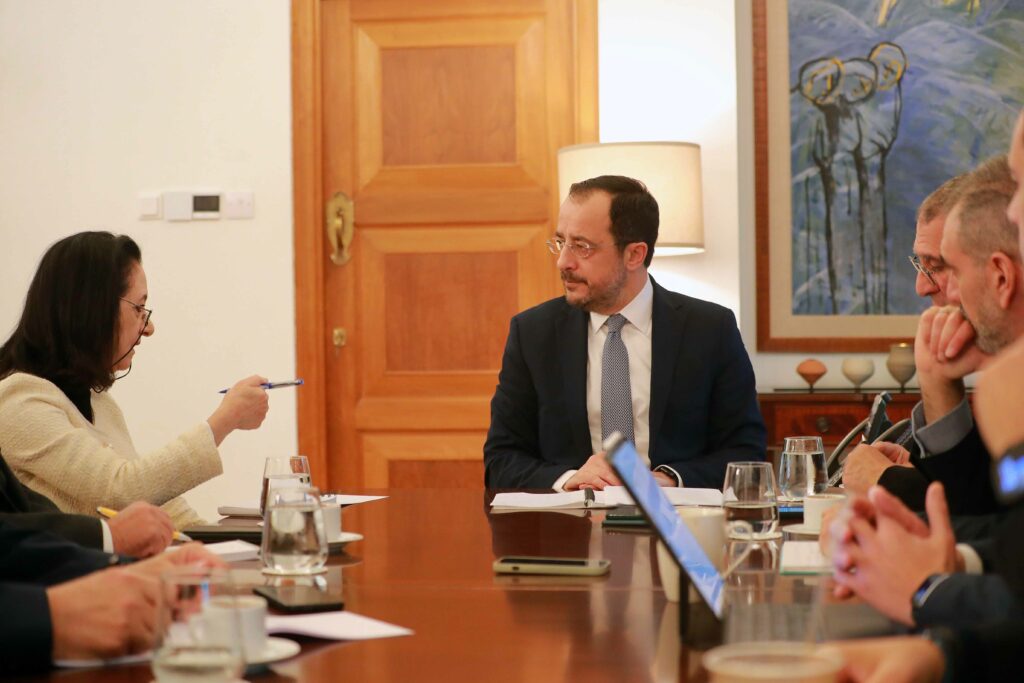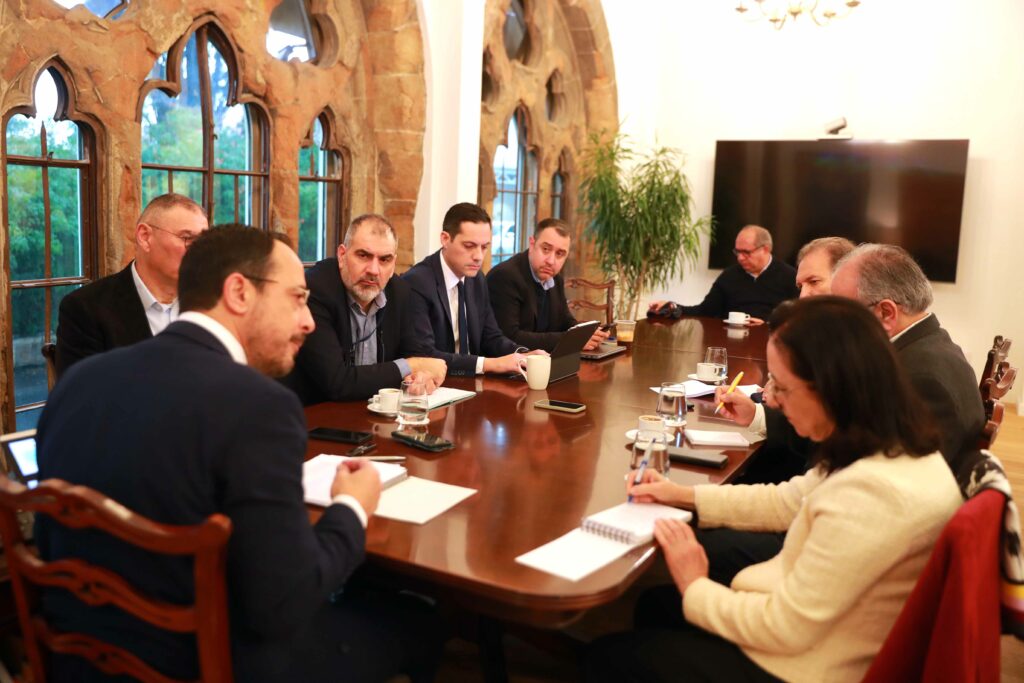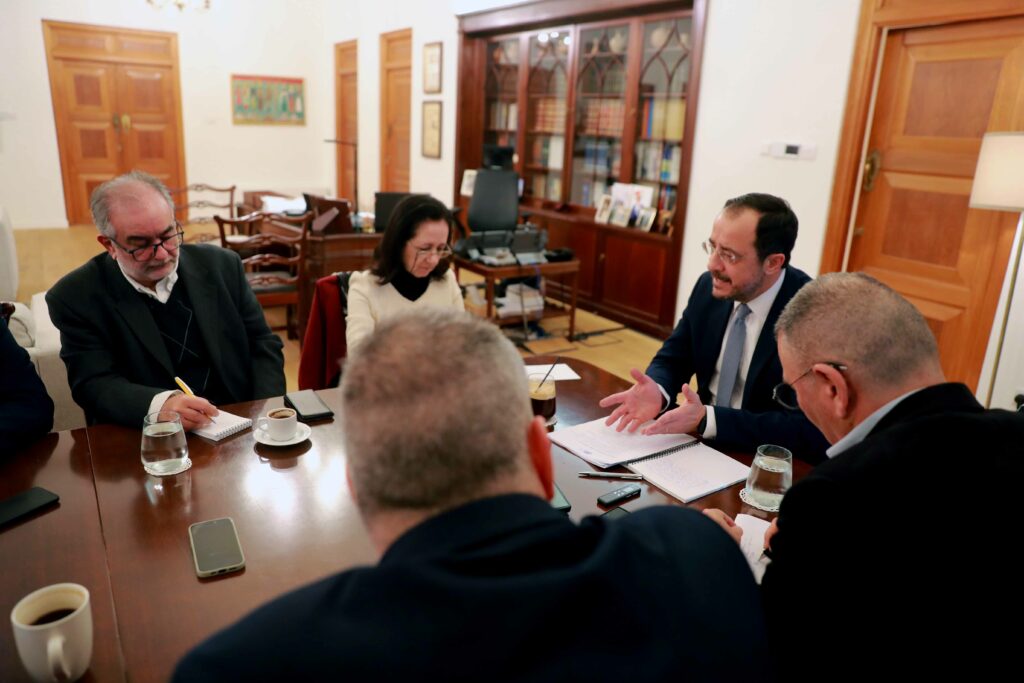Filenews 30 December 2024 - by
Andreas Pibishis,Androulla Taramounta,Kostas Venizelos,Frixos Dalitis
President Christodoulides is determined to exploit the comparative advantages of the Republic of Cyprus, especially its geographical position. In this context, it was decided to upgrade the naval base in Mari and the air base in Paphos.
The President made it clear that the bases will not be given to a third country, they are bases of the Republic of Cyprus that will provide facilities to any country that requests this. He makes no secret of the fact that discussions have taken place with the Americans. U.S. experts are expected to give their views in January. Their involvement will be either in know-how or with financial assistance.
The President in his interview with "F" does not mince his words when it comes to NATO. It suggests that Cyprus should have been in NATO since 1960. But Britain wanted to maintain on its own the comparative advantages it had in Cyprus with the bases. He did not rule out joining the Alliance, stressing that "when the conditions are created" we will also become a member state of NATO.
Regarding the Cyprus problem, the President of the Republic expects a UN envoy in January to prepare the ground. It assesses as a significant change that the President of the European Commission, moved the Cyprus issues and the financial regulation, and the Green Line regulation, which was under the Directorate-General for Reform and transferred the former to its own office and the regulations under the Directorate-General of the Regions. He notes that they are discussing names with Ursula von der Leyen for the European Union's special envoy.
– Will the Americans, in the end, be given a base on Cypriot soil?
We have decided, within the framework of strengthening the deterrent power of the Republic of Cyprus, to make use of what we consider to be comparative advantages. What foreigners see as a comparative advantage is our geographical position. We decided to proceed with the upgrade of the base in Mari and the upgrade of the base in Paphos. I have before me a note saying a cost of €14.7 million and an implementation time of 18 months. We talked to the Americans who are interested, and who have used the Andreas Papandreou base for humanitarian purposes. And I repeat it so that there is no misunderstanding. Senators from both parties came, I met them at the Andreas Papandreou base, I met with American military officials and I am glad that in their reports on cooperation with the National Guard they referred to the professionalism of the members of the force. Whether the Americans help us or not. the base "A. Papandreou" will be upgraded. The Americans have shown interest. The U.S. ambassador has informed me that specialists, technocrats dealing with air bases, will be coming in January. We want them to tell us their opinion on the infrastructure of the base.
– To what extent will their involvement be?
– Their involvement will be either with technical assistance or with financial assistance. In any case, the base will continue to be a base of the Republic of Cyprus. On the naval base, I am talking to the President of the European Commission. I spoke again recently about the EU's financial contribution through a specific programme that the Union has so that the base can host any ship from a Member State of the European Union.
– Will it be the basis of the Republic of Cyprus?
Both will be bases of the Republic of Cyprus. There is no question of focusing on anything else.
– Which will provide facilities to any state or only to Westerners?
– Accordingly, if it is for humanitarian purposes. Let me remind you that during the crisis our ports were used by China to evacuate two thousand Chinese from the region. We have not refused anyone on humanitarian grounds. There is no question of denying. It is all these things that highlight our country, to strengthen them even more. He had a day at base "A. Papandreou" when we could not accommodate people and we were forced to refuse and they made other choices. We do not want to lose this comparative advantage. And at the same time ours are being trained. As far as US military schools are concerned, we have sent four names of interested parties. We will soon have more announcements in this direction in relation to our military cooperation, before the end of Joe Biden's term.
– For all this, they accuse you of turning Cyprus into a base of operations for the Americans.
– We are neither a base nor anything else. Now, in relation to Syria. We went to Brussels, we presented the approach, the discussion took place. At the same time, however, as the Republic of Cyprus, we put two proposals down. First, in 2012 Cyprus was used as the base of the chemical unit in Syria, and we said that we are ready to play this role. Secondly, there is the issue of missing persons in Syria, we have the know-how, we are ready to take the initiative and help in this matter.

So, are we slowly moving towards NATO or is it still early?
It is not a NATO issue. If it were possible to join NATO tomorrow, we would do so. After all, if you ask me from a historical point of view, Cyprus should have been in NATO since 1960. The reason why it did not enter was not due to Turkey, it was due to another country that wanted to maintain on its own the comparative advantages it had in Cyprus. Since the accession of Cyprus is not feasible at this stage, we are trying to secure these advantages in terms of education, know-how and reorganization. And when the conditions are created to become a member state of NATO.
– What about the arms market?
– Yes, and the armaments market. The purchase of American armaments is in our thoughts.
– Defense costs. Economically, can Cyprus take these steps?
Yes, the state of our economy allows us to further strengthen the deterrent power of the Republic of Cyprus. That is why our economy is important, that is why I mentioned earlier all those internal factors that we need to strengthen. Because they also affect the Cyprus problem. Because you are much less vulnerable to both pressure and being exploited.
You say that we will work to break the way on the Cyprus problem. It is important that there is mobility.
We said that we will strengthen the Republic of Cyprus both in Europe and internationally. We did it, not with words, but with deeds. The fact that we managed to be elected to the United Nations Human Rights Council with such a high percentage says a lot. We said that one of our main goals is to clear Cyprus' name internationally. We are working a lot in this direction. All this is seen by foreign firms. No foreigner will come to invest if they see corruption in this country. We said we would stabilise the economy. Became.
On the Cyprus issue, while there has been a movement lately that seems likely to lead to an informal five-party meeting, aren't you worried about a possible failure that this time will have worse consequences than in the past?
Let me make it clear that a new failure on the Cyprus problem would be a very negative development. Some may invest in a negative development in order to build a narrative and argument to achieve other goals. That is why it is very important that any developments are positive. And what we do in our foreign policy is directly intertwined with the Cyprus problem. There is also interest in the Cyprus problem, because they see that what the Republic of Cyprus is doing today must be able to continue to do tomorrow through a possible solution of the Cyprus problem. All of them come, naturally, as our allies in the effort.

I expect that in January we will have a visit from the United Nations. Most likely Di Carlo, so prepare the ground. We are talking to all these states and strengthening our positions to help us. It is important to us that the President of the European Commission removed the Cyprus issues and the financial regulation, and the Green Line regulation, which was under the Directorate-General for Reform. The Commission's President recently decided that the Cyprus problem should be directly under its desk as far as the talks are concerned. The financial regulation and the Green Line regulation went under the Directorate-General for the Regions, since our occupied areas are part of the EU and the implementation of the European acquis has been suspended. There will be more on the part of the European Union to demonstrate its interest. Next March the Secretary General of the United Nations has been invited to the European Council and one of the issues on the agenda will be the Cyprus problem.
Does placing the Cyprus problem under the umbrella of Mrs von der Leyen also mean promoting the appointment of an EU envoy?
I can tell you that with the President we are discussing specific names.
– Have you been discussing names and discussing the issue of appointing an envoy for over a year?
Today we have a new Commission, which is already delivering. The fact that she took the Cyprus problem under her desk is very important. In Euro-Turkish matters, too, we have had this support from all these Member States.
You said that a visit by the United Nations is expected in January. So until then, will the issue of opening new crossing points also be clarified?
– It is not directly intertwined. As far as the crossing points are concerned, we have also done our preparatory work with maps and alternative proposals. We have positions, we are specific, we gave dates in January for this meeting to take place. At the United Nations reception, I suggested to Mr Tatar that we meet and that the negotiators inform us and give them instructions. I am waiting for an answer. Even tomorrow he tells me I'm ready for a meeting.
– Mr. Tatar says that apart from Mia Milia he does not discuss anything else.
– He can say whatever he wants in public. Let's discuss them and see the results. We also have positions and red lines. I will not say them publicly, I will go to the table and discuss them with him.
So the informal five-party meeting does not depend on an agreement on the barricades?
– It does not depend at all on the meeting. Although an agreement on the barricades would be a positive sign. Turkey's position was that Britain did not need to be present at the expanded meeting. Then Turkey argued that Britain in the enlarged country should be represented by a low-ranking Foreign Office official. See what it's to results. All this is inherent in our foreign policy.
– In case of a failure, what scares you? Recognitions;
What worries me most is that they build infrastructure to promote another form of solution. I see a desire on the part of Turkey to discuss. Even the discussions – which some had described as gloating, in Baku but especially in Budapest, with Turkey's foreign minister – were substantial. It was about the governance chapter. In other cases, while we were approaching them, the Turks were in no mood for discussion. Today I see a mood, but it will become clear in practice whether this mood they show – at least publicly – translates into something concrete on the Cyprus problem. There was criticism, even from coalition parties, for allowing Fidan after seven years to go to the informal Foreign Affairs Council (FAC). For us, it was important that he went to the FAC and heard from 22 other states what the Republic of Cyprus was saying. The fact that the European Commission's President went to Turkey – at a time when Ankara is trying to present itself in relation to Syria that it is the one that will play the role of mediator, and they are setting three conditions for the Euro-Turkish issues, and one of them is the Cyprus problem, is important, as of course Turkey's Cypriot obligations are defined through the Enlargement Conclusions. the result of the close and excellent cooperation between the Minister of Foreign Affairs and the Deputy Minister of European Affairs, two of my closest associates.

– (EL) Mr President, to those who are concerned that with Turkey's upgrading in the conflict environment that exists in our region, that Cyprus is the weak link, what is your counter-argument?
Assad's removal was a positive development, considering what has happened in recent years and the aligned stance of the vast majority of the international community on the regime. The most important thing is the next day in Syria. At the last European Council, first myself and then the Prime Minister of Greece, we presented what the situation is in the region. And I can tell you that many of our colleagues did not know what this situation was. It is very important that of what we mentioned were the positions of Egypt, Jordan and the United Arab Emirates. We see reactions from the Western world, as we did during the Arab Spring, that almost all the problems of the region have been solved and in the end what resulted was an Arab winter. We saw it in Libya and how the situation in Syria began. That's why, together with Greece and Austria, we put down a specific plan and said that there should be a road map. We pointed out that Assad's removal is a positive development, Syria is entering a new era and as the EU we are ready to help, to play a role. This help depends step by step. If they do A, the EU will do B and so on. If, on the other hand, they exclude minorities, Christians, etc. the EU will not come to help. Let me remind you that Mr. Fidan may have been in Syria, but the foreign minister of Cyprus was in Israel. And it has its importance.
The Republic of Cyprus is not weak politically
Is the EU's aim to speak directly to the new state of affairs in Syria?
As we speak, there is contact at a lower level in the EU. We told them that Syria is only 100 kilometers from Cyprus, and therefore to allow us to know better what is happening than any other Member State. We asked for a special representative to talk to them. We went to the summit and represented not only Cyprus but also Egypt and Jordan and the UAE. These were their positions. And these countries have asked us to transfer their positions to Brussels, which shows that they trust us.
People's concerns that they are reassured that Turkey may not get where it wants but will be given in return in Cyprus;
If Cyprus were weak, politically, externally, Turkey might be able to achieve these goals. But that is not the case.
